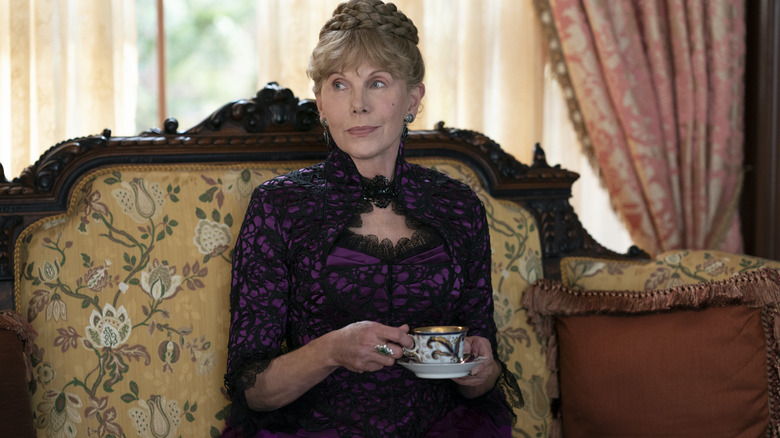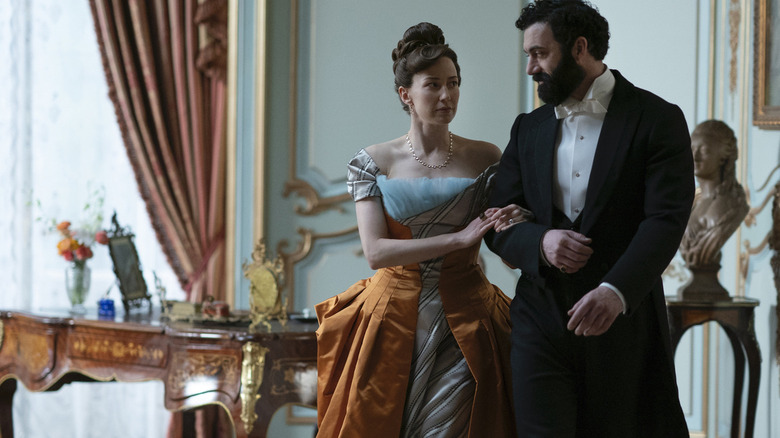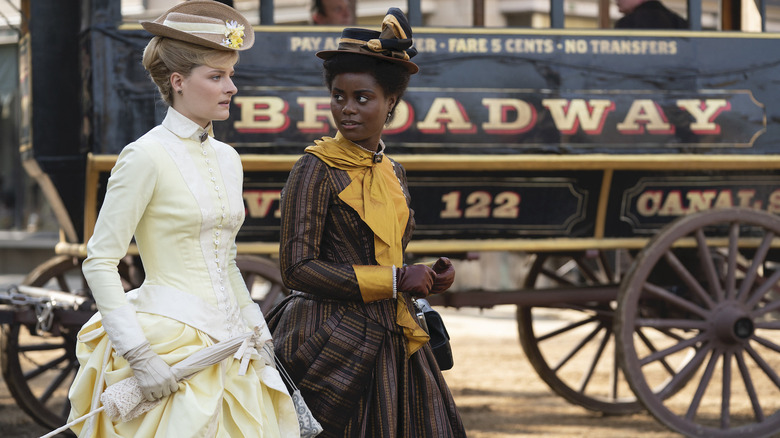
Julian Fellowes has a penchant for tossing together top-quality costume drama ingredients, finessing his way past oppression, sweetening wealth porn to perfection, and ultimately whipping up the most sumptuous comfort food you've ever laid your eyes on. The creator behind whip-smart period pieces like "Downton Abbey," "Belgravia," and "The English Game" has walked this road many times before, so it's no surprise to discover he's up to his old tricks with HBO's "The Gilded Age."
Fellowes is a costume drama veteran and this particular passion project has been in the works for so long that it's bound to impress. In the hopes of living up to long-held expectations, "The Gilded Age" quickly gets to work ticking all the period piece boxes and providing the comforting ease of escapism. Not only are you invited to disappear into the wondrous world of New York high society, it all takes place in a rose-colored 1800s America, where real problems seldom exist onscreen and never linger when they do! My conscious mind tried putting up a fight against the many flights of fancy but those efforts quickly proved futile: the greatest asset that "The Gilded Age" can tout is being unabashedly earnest.
The series is set against the backdrop of rapid change: New York is grappling with a diamond-cut class divide as a social war wages on between aristocracy and new money. Caught in the middle and bursting with pink-cheeked naiveté is Marian Brook (Louisa Jacobson), a young woman sent to live with her estranged aunts after her father's death left her penniless. Luckily, said aunts can afford to support her thanks to their comfortable aristocratic wealth — all Marian must do is adjust to the new rules of her life. "We only receive the old people, not the new," explains the proud and stubborn Agnes van Rhijn (Christine Baranski), "to hold back the tide of vulgarians that threaten to engulf us."
A product of the old world, Agnes resents the tides of progress flooding the city. She's attuned to the prejudice of high society, but values the system in place because she was a firsthand survivor. Now a widow, Agnes earned her wealth through an unhappy marriage — a sacrifice that allows her to support both Marian and her spinster sister, Ada Brook (Cynthia Nixon). But unbeknownst to Agnes, the arrival of her niece invites change directly into her household — Marian doesn't care to turn her nose up at one person or another. She's idealistic as she navigates New York, learning the rules but choosing when to follow them.
A Ruthless Duo Rises Above The Stacked Cast

Marian wears her innocence on her sleeve, which is generally endearing but occasionally grating. Her faults are most noticeable when paired with the kindred spirit she befriends during her journey to the city, Peggy Scott (Denée Benton). An ambitious young writer and a Black woman in post-Civil War New York, Peggy faces more adversity than Marian can comprehend. But she takes it in stride, determined to carve a path forward and get her words printed to the public. Peggy might very well be the heart of the show, given she's the least conflicting character to root for — and that's taking into account the many faces populating "The Gilded Age."
The all-star cast is a double edged sword that generally works in the show's favor but occasionally stirs some trouble. The show is so densely populated — with stars including Audra McDonald, Donna Murphy, Nathan Lane, and Taissa Farmiga — that few get room to shine. Just take Christine Baranski, for example; despite appearing in every episode, you can't help but feel her talents are wasted. Don't get me wrong, I thoroughly enjoy every scene with the acid-tongued Agnes van Rhijn, who never fails to disappoint with sharp one-liners or biting advice. And if they want to use Baranski as a joke machine for quotable moments, who am I to complain? Just watching her react to Ada's overexcitement is endlessly entertaining, but Baranski's character is ripe for drama and the actress could deliver so much more.
But perhaps the big Van Rhijn outbursts lie ahead, and our patience for Baranski's shining moments will pay off. As for now, the laurels go to the stars that "The Gilded Age" allots the most momentum: the New Money elites, Bertha (Carrie Coon) and George Russell (Morgan Spector). Agnes paints the newcomers in broad strokes of villainy and when George Russell arrives with his diabolical beard, it's tempting to believe her. But for all their conniving ways, both Russell's are imbued with undeniable humanity.
A ruthless railroad tycoon, George knows the worth of money and swings his power around with little care for others — but his love for Bertha is fervent. He sees her as his equal and admires her ambition as she claws their family into the good graces of high society. Bertha is the epitome of new money, with plans to walk through every door her money can open and knock down the few it can't. The chemistry between Spector and Coon is ablaze in ever scene, the duo perfectly suited for one another and searing with charisma. Are they the villains of the series? Agnes Van Rhijn certainly believes so, and the Russell's despicable schemes would agree. But "The Gilded Age" has a way of rooting their determination in emotion so effectively that you almost forget they aren't fighting for anything noble or meaningful. And this is a big problem for the series, because it can't hep but try to cover its own tracks.
Taking The Best (And Worst) Of The Genre

"The Gilded Age" is well-aware of the boundaries it should be pushing. The show occasionally prods at the confines of its historical fantasy — questioning its own romanticisization of wealth — but each attempt is more half-hearted than the last. On the rare occasion that it grapples with race, wealth, or the difficulty of finding goodness in a system so corrupt, it does so with awkward straightforwardness. One moment a character is bursting at the seams, voicing an injustice we've all been considering — but as quickly as an issue is addressed, it's dismissed. We move back to the realm of comforting ease and the fantasy of 1800s New York — but the flow has been disrupted.
"The Gilded Age" wants to be both earnest and self-referential, knowing the genre can be more than gowns and grand manors, but is disinterested in further exploration. While period dramas often take an upstairs-downstairs approach, the servants are a small fraction of this series and their moments in the spotlight are noticeably tepid. We're offered brief glimpses into their internal lives that feel more like obligatory check-ins than genuine exploration. They aren't given depth or attention, and are easily overshadowed by the "bigger" questions of the series — like who will Marian marry? And will the Russell's and Van Rhijn's ever dine together? The series is struggling with an identity crisis, unsure just how much it wants to explore the genre: "The Gilded Age" can be bolder and actually delve into the questions it timidly raises or it can settle in its comforting food niche, an easy socialite soap opera. The quality of the work speaks for itself — either way, this series has plenty potential for greatness.
The sumptuous drama lives quite comfortably in the shadow of its predecessors. It's a little less mannered than "Downton Abbey" (sex is slightly less subtextual) but won't leave you blushing like more recent entries into the genre ("Gentleman Jack," "Harlots"). And though it doesn't quite match the magnificent melodrama of Downton, "The Gilded Age" is propelled forward by the clash of the New vs. Old. It occasionally meanders through its overly-large cast to show off the big names along for the ride, but its drama will sweep you off your feet in an instant. Will you fall in love with "The Gilded Age" if costume dramas aren't your thing? I doubt it. But if you delight in grand manors, acid-tongued matriarchs, and the intricacies of high society courtship, then you're in for a blast! If you want to disappear into a less complicated world that's brimming with all kinds of intoxicating tension, then you're all set! If this is your genre of choice, "The Gilded Age" is a welcome indulgence.
Read this next: The 15 Best Jane Austen Adaptations Ranked
The post The Gilded Age Review: Earnest Escapism That Ticks All The Period Piece Boxes appeared first on /Film.
0 Comments